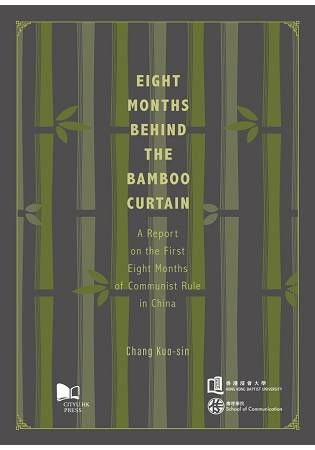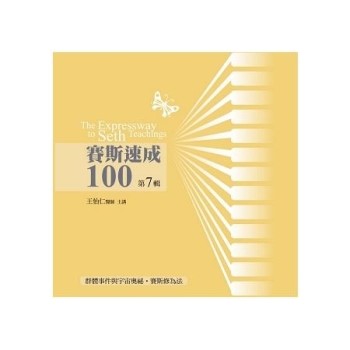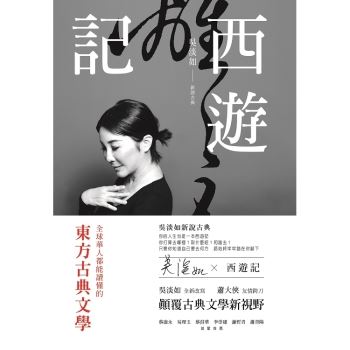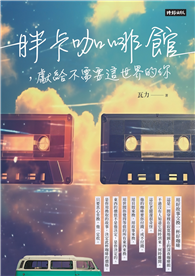| FindBook |
|
有 1 項符合
eight months behind the bamboo curtain—a report on the first eight months of communist rule in china的圖書 |
 |
$ 435 ~ 512 | Eight Months Behind the Bamboo Curtain—A Report on the First Eight Months of Communist Rule in China
作者:CHANG Kuo-sin 出版社:香港城市大學出版社 出版日期:2016-09-01 語言:繁體書  共 3 筆 → 查價格、看圖書介紹 共 3 筆 → 查價格、看圖書介紹
|
|
|
圖書介紹 - 資料來源:博客來 評分:
圖書名稱:Eight Months Behind the Bamboo Curtain:A Report on the First Eight Months of Communist Rule in China
內容簡介
This was the motto of Chang Kuo-sin, and the ideal which he inspired generations of students of communication to follow. He proved his own dedication to this when, in 1949, he found himself in Nanking, the former nationalist capital, under the rule of the newly victorious communists. For eight months he lived and attempted to work in the midst of these historical changes. He managed to smuggle his detailed notes out to share with the world at a time when almost no reports of the new regime were being published. To mark the centenary of his birth, Hong Kong Baptist University’s School of Communication has republished this important work by one of its most distinguished professors.
作者介紹
作者簡介
CHANG Kuo-sin
CHANG Kuo Sin (1916–2006) worked as a translator, a reporter, a film-maker, an author, a professor and the head of the Communication Department of the Hong Kong Baptist College. He lived through some of the most turbulent times of the twentieth century and bore witness, with his characteristic devotion to the truth, to some of the defining events of our times.
CHANG Kuo-sin
CHANG Kuo Sin (1916–2006) worked as a translator, a reporter, a film-maker, an author, a professor and the head of the Communication Department of the Hong Kong Baptist College. He lived through some of the most turbulent times of the twentieth century and bore witness, with his characteristic devotion to the truth, to some of the defining events of our times.
目錄
PART ONE
Communists Rule in Nanking After One Month of Trial
(April 23 – May 23, 1949)
1. Communist Government
2. Popular Reactions
3. Communist Press
4. The Communist Army
5. Nationalist Retreat from Nanking
6. Communists and Foreign Recognition
PART TWO
Communist Rule in China After Eight Months of Trial
(April – December 1949)
1. Communist Totalitarianism
2. Communist Efforts to Disguise Totalitarianism
3. Democratic Spirit Within the Communist Party
4. The Threat of Diversionism Inside the Communist Party
5. Communist “Lean to One Side” Principle
6. The Merits and Demerits of the Communist Government
7. Disillusionment and Discontent in Communist China
8. Causes of Disillusionment and Discontent
9. Disillusionment and Discontent Among Workers
10. Disillusion and Discontent Among Farmers
11. Problems Facing the Communists – Currency
12. Problems Facing the Communists – Agriculture and the Industry
13. Problems Facing the Communists – Famine
14. Problems Facing the Communists – How to Sell Soviet Russia to the Chinese People
15. Soviet Help in the Sovietisation of China
16. Soviet Russians and Manchuria
17. Moslem Opposition to Communist Rule
18. Foreigners in Communist China
19. “Democratic Personages” in Peking
20. Will the Communists Turn Titoists in the Future?
21. Farewell to Communist China
Communists Rule in Nanking After One Month of Trial
(April 23 – May 23, 1949)
1. Communist Government
2. Popular Reactions
3. Communist Press
4. The Communist Army
5. Nationalist Retreat from Nanking
6. Communists and Foreign Recognition
PART TWO
Communist Rule in China After Eight Months of Trial
(April – December 1949)
1. Communist Totalitarianism
2. Communist Efforts to Disguise Totalitarianism
3. Democratic Spirit Within the Communist Party
4. The Threat of Diversionism Inside the Communist Party
5. Communist “Lean to One Side” Principle
6. The Merits and Demerits of the Communist Government
7. Disillusionment and Discontent in Communist China
8. Causes of Disillusionment and Discontent
9. Disillusionment and Discontent Among Workers
10. Disillusion and Discontent Among Farmers
11. Problems Facing the Communists – Currency
12. Problems Facing the Communists – Agriculture and the Industry
13. Problems Facing the Communists – Famine
14. Problems Facing the Communists – How to Sell Soviet Russia to the Chinese People
15. Soviet Help in the Sovietisation of China
16. Soviet Russians and Manchuria
17. Moslem Opposition to Communist Rule
18. Foreigners in Communist China
19. “Democratic Personages” in Peking
20. Will the Communists Turn Titoists in the Future?
21. Farewell to Communist China
序
Preface to the Second Edition
My basic motivation in republishing this little book from a manuscript written forty-nine years ago (which was published in Chinese the same year) is to preserve a memento of my old days with the United Press of America, an experience that I value tremendously in my life.
I was the United States Staff Correspondent in China from 1946 to 1952, based in Nanking, the nationalist capital of China. When the Chinese communists banned foreign news agencies in the fall of 1949, I was transferred to the United Press Bureau in Hong Kong.
The original manuscript for this book was made for publication in Chinese. I must have kept copies but have lost them in the long years since and had not expected to see any copies until this one was found among the wartime papers of US General Claire L. Chennault.
General Chennault achieved fame when he organised the American Volunteer Group (AVG), also known as the Flying Tigers, in 1941 to aid China in the war against Japan. It was later expanded into the US 14th Air Force, and General Chennault became its commander with the rank of Lieutenant General.
This little book has no contemporary interest, albeit perhaps some contemporary relevance since it is possible that what the Chinese communists encountered and experienced in the first eight months of their rule might have helped convert them into what they are today.
The Chinese communists can be said to have been tamed at birth, the cumulative result being: the Chinese communists were compelled to abandon the radicalism of their Marxist ideology and continue to accept the moderation of Chinese philosophy, though stubbornly keeping their brand name – communism. They answered in their own way the question of what is in a name: as long as they keep their name, they could and are willing to do anything else.
At the end of my eight months stay behind the Bamboo Curtain, I left China with mixed feelings – with regret that I would not be able to witness what could be described as one of China’s most cataclysmic transformations in history; and with happiness that moving to Hong Kong would assure my family and me a life without uncertainty and fear, where we could at least be sure of tomorrow.
In 1956, I met veteran journalist K.S. Chang in Singapore who gave me the first hint of what might have happened to me if I had stayed behind in China. His initials are the same as mine, leading the Chinese communists to mistake him for me. Mr. Chang was formerly editor-in-chief of the English-language China Times in Shanghai and moved to Singapore before the “liberation” to become the editor-in-chief of the Singapore Standard, often called the Tiger Standard. His wife, who was still in Shanghai when the city was “liberated”, was denied an exit visa to join her husband in Singapore. The Chinese communists thought she was my wife. After they realised their mistake, they granted her the exit visa. The Chinese communists continued their pursuit of me, harassing and questioning some of my friends about my whereabouts.
In China I had watched and covered its greatest intellectual and political revolution in history. I learned much about the forces of history which alienated the government from the people and inspired a revolution to establish democracy and freedom. I learned, too, that all good things do not always end in good results.
The Chinese communist revolution to overthrow autocracy and oppression ended, as we all know by now, in worse democracy and oppression. That was what appeared in the first eight months of communist rule in China. But it has changed over the years and has become more acceptable to the Chinese people.
In my 1950 manuscript, I reported copiously on the negative Chinese public reactions to communist rule – cynical, sceptical and even sometimes belligerent. I observed that the Chinese communists would have to change their ways or they would ultimately fail and also that, as communists, they would succeed, while their communism would not.
These two observations seemed to have been amply justified by subsequent developments. The Chinese communists have changed and they are still in power. They retain their name – communists – but have abandoned their communism.
Although I had not predicted the Soviet-Chinese communist split in 1960, I had concluded from the negative public reactions that the two communist countries could not stay ideological allies for too long. The split, however, is to be expected as a logical conclusion of the obvious Chinese people’s rejection of Soviet Russia as China’s “Big Brother”, as she had been portrayed by Chinese communist propaganda.
When the time came for my family and me to leave China for Hong Kong, my biggest problem was how to sneak out the volumes of notes I had taken during my stay behind the Bamboo Curtain so that I could use them for my reports. In a moment of enlightenment or in a stroke of luck, I thought of a way to do so and hence embarked on my long journey from Shanghai.
My idea, which to my delight proved to be a complete success, was to buy a Chinese dinner set for twelve persons of porcelain bowls, dishes and spoons and a big camphor chest. I packed the whole dinner set in the camphor chest using my notes as wrapping paper. The communist guards on several occasions looked into the camphor chest, but when they saw the dinner set wrapped in what they thought was merely used paper, they waved me through.
During my trip from Shanghai to Hong Kong I avoided as far as possible revealing my identity as an “imperialist running-dog” correspondent. Only on two occasions was I compelled to reveal my identity, but to my surprise the communist guards became more polite to me.
The guards did not know that I was carrying volumes of notes I had made in the eight months behind the Bamboo Curtain on what had happened after the communists took over and my observations on what had happened between the communists and the people. I knew that I had to write these notes of my experiences when caught behind the Bamboo Curtain – a region closed to the outside world; the United Press surely expected this of me. I had worried a lot about how to get the notes out of China because I knew that if I were caught I would be charged with being a spy.
When taking the notes, I made three sets of them. Apart from the set I sneaked out in the camphor chest, I sent one set by mail to Hong Kong from Shanghai and one set from Canton. The set from Canton arrived five months later, while the set from Shanghai never arrived. The camphor chest set was the only set I had on arrival in Hong Kong and they gave me the data to write the twenty-one articles for the United Press. These articles were widely used and became what were called the first inside reports from behind the Bamboo Curtain.
I wish to thank my granddaughter Jennifer Nee-wah Kim for editing the original manuscript for republication in this book. She has done a great job in putting things in an orderly manner. For this I shall be forever grateful.
CHANG Kuo-sin
December 1999
Sacramento, California
My basic motivation in republishing this little book from a manuscript written forty-nine years ago (which was published in Chinese the same year) is to preserve a memento of my old days with the United Press of America, an experience that I value tremendously in my life.
I was the United States Staff Correspondent in China from 1946 to 1952, based in Nanking, the nationalist capital of China. When the Chinese communists banned foreign news agencies in the fall of 1949, I was transferred to the United Press Bureau in Hong Kong.
The original manuscript for this book was made for publication in Chinese. I must have kept copies but have lost them in the long years since and had not expected to see any copies until this one was found among the wartime papers of US General Claire L. Chennault.
General Chennault achieved fame when he organised the American Volunteer Group (AVG), also known as the Flying Tigers, in 1941 to aid China in the war against Japan. It was later expanded into the US 14th Air Force, and General Chennault became its commander with the rank of Lieutenant General.
This little book has no contemporary interest, albeit perhaps some contemporary relevance since it is possible that what the Chinese communists encountered and experienced in the first eight months of their rule might have helped convert them into what they are today.
The Chinese communists can be said to have been tamed at birth, the cumulative result being: the Chinese communists were compelled to abandon the radicalism of their Marxist ideology and continue to accept the moderation of Chinese philosophy, though stubbornly keeping their brand name – communism. They answered in their own way the question of what is in a name: as long as they keep their name, they could and are willing to do anything else.
At the end of my eight months stay behind the Bamboo Curtain, I left China with mixed feelings – with regret that I would not be able to witness what could be described as one of China’s most cataclysmic transformations in history; and with happiness that moving to Hong Kong would assure my family and me a life without uncertainty and fear, where we could at least be sure of tomorrow.
In 1956, I met veteran journalist K.S. Chang in Singapore who gave me the first hint of what might have happened to me if I had stayed behind in China. His initials are the same as mine, leading the Chinese communists to mistake him for me. Mr. Chang was formerly editor-in-chief of the English-language China Times in Shanghai and moved to Singapore before the “liberation” to become the editor-in-chief of the Singapore Standard, often called the Tiger Standard. His wife, who was still in Shanghai when the city was “liberated”, was denied an exit visa to join her husband in Singapore. The Chinese communists thought she was my wife. After they realised their mistake, they granted her the exit visa. The Chinese communists continued their pursuit of me, harassing and questioning some of my friends about my whereabouts.
In China I had watched and covered its greatest intellectual and political revolution in history. I learned much about the forces of history which alienated the government from the people and inspired a revolution to establish democracy and freedom. I learned, too, that all good things do not always end in good results.
The Chinese communist revolution to overthrow autocracy and oppression ended, as we all know by now, in worse democracy and oppression. That was what appeared in the first eight months of communist rule in China. But it has changed over the years and has become more acceptable to the Chinese people.
In my 1950 manuscript, I reported copiously on the negative Chinese public reactions to communist rule – cynical, sceptical and even sometimes belligerent. I observed that the Chinese communists would have to change their ways or they would ultimately fail and also that, as communists, they would succeed, while their communism would not.
These two observations seemed to have been amply justified by subsequent developments. The Chinese communists have changed and they are still in power. They retain their name – communists – but have abandoned their communism.
Although I had not predicted the Soviet-Chinese communist split in 1960, I had concluded from the negative public reactions that the two communist countries could not stay ideological allies for too long. The split, however, is to be expected as a logical conclusion of the obvious Chinese people’s rejection of Soviet Russia as China’s “Big Brother”, as she had been portrayed by Chinese communist propaganda.
When the time came for my family and me to leave China for Hong Kong, my biggest problem was how to sneak out the volumes of notes I had taken during my stay behind the Bamboo Curtain so that I could use them for my reports. In a moment of enlightenment or in a stroke of luck, I thought of a way to do so and hence embarked on my long journey from Shanghai.
My idea, which to my delight proved to be a complete success, was to buy a Chinese dinner set for twelve persons of porcelain bowls, dishes and spoons and a big camphor chest. I packed the whole dinner set in the camphor chest using my notes as wrapping paper. The communist guards on several occasions looked into the camphor chest, but when they saw the dinner set wrapped in what they thought was merely used paper, they waved me through.
During my trip from Shanghai to Hong Kong I avoided as far as possible revealing my identity as an “imperialist running-dog” correspondent. Only on two occasions was I compelled to reveal my identity, but to my surprise the communist guards became more polite to me.
The guards did not know that I was carrying volumes of notes I had made in the eight months behind the Bamboo Curtain on what had happened after the communists took over and my observations on what had happened between the communists and the people. I knew that I had to write these notes of my experiences when caught behind the Bamboo Curtain – a region closed to the outside world; the United Press surely expected this of me. I had worried a lot about how to get the notes out of China because I knew that if I were caught I would be charged with being a spy.
When taking the notes, I made three sets of them. Apart from the set I sneaked out in the camphor chest, I sent one set by mail to Hong Kong from Shanghai and one set from Canton. The set from Canton arrived five months later, while the set from Shanghai never arrived. The camphor chest set was the only set I had on arrival in Hong Kong and they gave me the data to write the twenty-one articles for the United Press. These articles were widely used and became what were called the first inside reports from behind the Bamboo Curtain.
I wish to thank my granddaughter Jennifer Nee-wah Kim for editing the original manuscript for republication in this book. She has done a great job in putting things in an orderly manner. For this I shall be forever grateful.
CHANG Kuo-sin
December 1999
Sacramento, California
|











